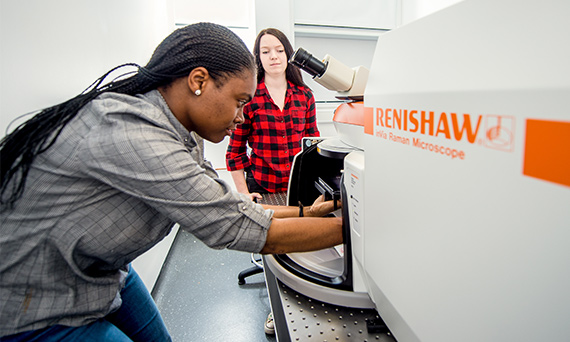Types of engagement
Year-long placement for MChem students
The aim of the programme is to provide students with the opportunity to experience the environment of a real chemistry workplace, apply theoretical knowledge that they have learnt within the first three years of the course and to undertake a piece of original applied research in the industrial setting.
Placements take place during the 4th and final year of the degree, so students will go to the placement with 3 years of theory and practical experience. As the students graduate straight after the placement, they will be ready to accept jobs giving continuity to your company.
For more information, contact the Chemistry Placement coordinator, Dr M. Paz Munoz-Herranz.
Internships: from 5 days to 2 months projects
Businesses are able to work with our undergraduate and recent graduate students via internship programmes available in a variety of durations and formats from short five-day shadowing work to four-to-eight week projects during the summer.
The internship programme is run by the Student Employability Team in the Faculty of Science and Technology in collaboration with the Chemistry Department.
For more information on how to get involved, contact Pam Pickles, Student Employability Manager for the Faculty of Science and Technology or Dr M. Paz Munoz-Herranz, Chemistry Director of Engagement.
Knowledge Transfer Partnerships 1-3 year projects
A KTP is a relationship formed between a company and an academic institution which facilitates the exchange of knowledge, technology and skills to which the company partner currently has no access. Each partnership employs a recently qualified graduate to work in a company on a project of strategic importance to the business, whilst also being supervised by the academic partner. KTPs last between 1 and 3 years with the graduate normally based at the company for the duration although employed by the university.
Collaborative Awards in Science and Engineering 3-5 year projects
CASE offers a way for businesses to develop an extended partnership with the university through a heavily subsided long term R&D project.
Awarded by the UK Research Council, CASE Studentships provide funding for the ablest students to undertake three years of study for a PhD degree (five years for part-time awards) and work on a project jointly designed and supervised by a university department and a company. Companies can be from the public, private or voluntary sectors, ranging from multinationals, SMEs, local authorities and registered charities.
The student will be specially selected in collaboration with the company and will spend at least 3 months during the period of the award at the company's premises. The company partner is required to contribute a minimum of a third of the Research Council's contribution.
Doctoral Training Centres 6 months-3 year projects
DTCs represent a new approach to postgraduate study, with the aim of attracting and nurturing talented and skilled researchers. DTC-based students carry out a PhD-level research project together with taught coursework in a supportive and exciting environment.
The key aspects of DTCs are the industry focus, collaboration and the impact the research has on the UK's economy. All PhDs through the centres have the integral involvement of an industrial partner both for training and in determining the scope of the research.
Lancaster's DTCs include:






